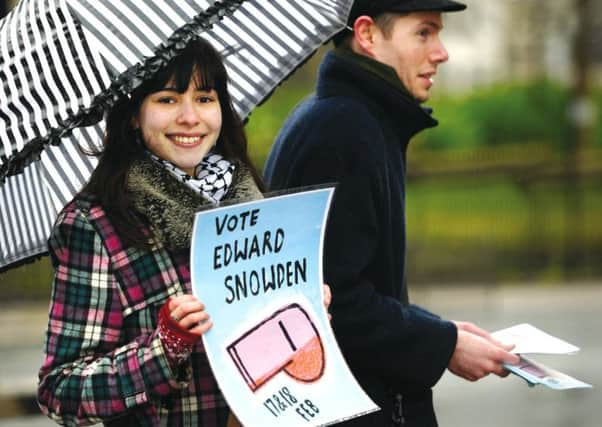Dani Garavelli: Snowden vote a grand statement


“What morons would vote in a pariah who cannot even come to Scotland when they had a trio of passionate candidates right here to choose from?” the voices of reason railed.
It is true that, at a time of austerity, author Alan Bissett, Episcopal minister the Very Rev Kelvin Holdsworth and world champion cyclist Graeme Obree would all have been able to represent students’ interests in person, whereas fugitive Snowden had to issue his post-election statement through the Guardian newspaper. But all that sneering at his supporters’ supposed stupidity? It was almost as if everyone had forgotten what it was like to be young. Or worse still that they wanted to impose their own dull practicality on contrary young shoulders. Because the world would be a better place if today’s undergraduates were more concerned about the rising price of campus food than the issues of the day.
Advertisement
Hide AdAdvertisement
Hide AdPersonally, I think they were over-stating the significance of the role of the rector who has the power to chair the university court (but not to vote), especially now students are represented on university governing bodies and are well able to organise their own protests – see the Free Hetherington campaign. And, although outgoing rector Charles Kennedy was very active, holding surgeries and campaigning against the cuts, there are no guarantees a “working” rector will follow through. Actor Ross Kemp did nothing and was forced to resign after a vote of no confidence. I don’t doubt this year’s other candidates would have been cast more in Kennedy’s mould, but is it so shocking that the students decided they’d prefer to make a grander statement?
It’s not as if it’s the first time. ANC president Albert Luthuli; Winnie Mandela; Mordechai Vanunu, who leaked details of Israel’s nuclear weapons programme; were all chosen as a symbol of what Glasgow University students stood for as opposed to what they hoped to gain.
“Oh,” but the middle-aged carpers argue, “that was different.” Those people were figureheads for great causes whereas Snowden is a shifty, teenage troll-turned-leaker who, whatever you think of his attempt to highlight government surveillance, has too little liking for the welfare system and too great a liking for guns. To this I would say two things. Firstly, anyone who thinks Glasgow University students are all pinkos who would baulk at Snowden’s libertarian philosophy clearly hasn’t stepped foot in its older union. And secondly the quality of his character isn’t the issue. He was elected because he has screwed with authority and because his preoccupation with the collation and control of information, like Anonymous’s and LulzSec’s, is the zeitgeist. Just as the anti-apartheid movement and the Sandinistas were in the late 1980s. For many, Snowden stands for democracy, even if his belief in a more free and open society was somewhat undermined by his flight to Russia.
I was on Glasgow University’s Students’ Representative Council in February 1987 when Winnie Mandela was elected. I wish I could tell you that I remember who the other candidates were but I can’t, because, frankly, with glamorous Winnie on the list, who cared? I have, however, looked them up. They were: maths teacher Kenneth Dyer; graduate Neil Henderson; Bishop Isaac Mokoena, a South African churchman who opposed violence and sanctions; and Professor Esmond Wright, a historian and one-time Tory MP for Pollok.
There are some worthy candidates there I’m sure, but excuse me while I stifle a yawn. In his pitch, Dyer said: “The rectorship is not an honorary or symbolic office to be conferred on causes to which we are sympathetic, but rather to be used as a tool in building effective representation.” Then the students went and did what students do: they cast more votes for Winnie Mandela than for the other four put together. Plus ça change.
She was not an uncontroversial candidate, either. Only ten months before her election, she had endorsed necklacing – burning people alive using tyres and petrol, and there were many who questioned the wisdom of her nomination. Given that the Truth and Reconciliation Commission later found her accountable for gross violations of human rights, those naysayers were probably vindicated. And yet her election served its purpose. It drew attention to the university and the anti-apartheid movement. Had Dyer been elected, the students may have been better-represented, but nobody would have talked about it then and, assuredly, not now.
And so, though I admit that with my own middle-aged head on I would have voted for Holdsworth or Bissett, I don’t blame the students for electing Snowden, whose victory statement was rousing. “If we do not contest the violation of the fundamental right of free people to be left unmolested in their thoughts, associations, and communications, to be free from suspicion without cause, we will have lost the foundation of our thinking society,” he said.
If students voted for him as a symbol of resistance to overbearing authority, then good on them. I’m glad the younger generation can see beyond its own backyard. And if they did it just to wind up the chatterati, then good on them too. I’m glad, despite all the economic pressures, they’ve still got enough spirit to stick up the middle finger at people like me. They’ve got the rest of their lives to be sensible and conformist.
Twitter: @DaniGaravelli1